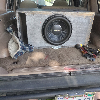FHfirefighter
Active Member
- Joined
- May 22, 2003
- Messages
- 91
- Reaction score
- 1
- City, State
- Hanover, MD
- Year, Model & Trim Level
- '97 Sport
Ok, so my problem started with a grinding, groaning noise from my front driver's side brake, typically at low speeds just applying the brakes to come to a complete stop. I inspected the pads and rotors (both sides to be sure) and they were all in great shape. But I did notice that it looked like someone had set off a grease bomb in my (driver's side front) wheel weel; there was grease all over the hubs, breaks, suspension, etc, and slung onto the wheel well body itself. My theory is something (bearings?) failed in the hub assembly area around where the boot protecting the axel meets the hub assembly. This is/may be causing the hub move around more than usual, causing the brake shoes to press against the part of the rotor that they don't usually contact (which is rusty, thereby causing the noise). I think it only happening at low speeds works with this theory because the wheel spins like a top: when it's faster, it's going to have a tight, steady spin...but when it slows down, if there is room for it to wobble, it will wobble more as it spins more slowly.
So basically what I'm asking is does this sound like a good theory or am I off-base? I'm planning to order a new hub assembly: (http://www.1aauto.com/1A/hub_assemb...5&ovchn=OTHER&ovcpn=Froogle&ovcrn=&ovtac=CMP), but I wanted to get some opinions before I drop close to $200 and find out it's not the problem. Thanks!
So basically what I'm asking is does this sound like a good theory or am I off-base? I'm planning to order a new hub assembly: (http://www.1aauto.com/1A/hub_assemb...5&ovchn=OTHER&ovcpn=Froogle&ovcrn=&ovtac=CMP), but I wanted to get some opinions before I drop close to $200 and find out it's not the problem. Thanks!











